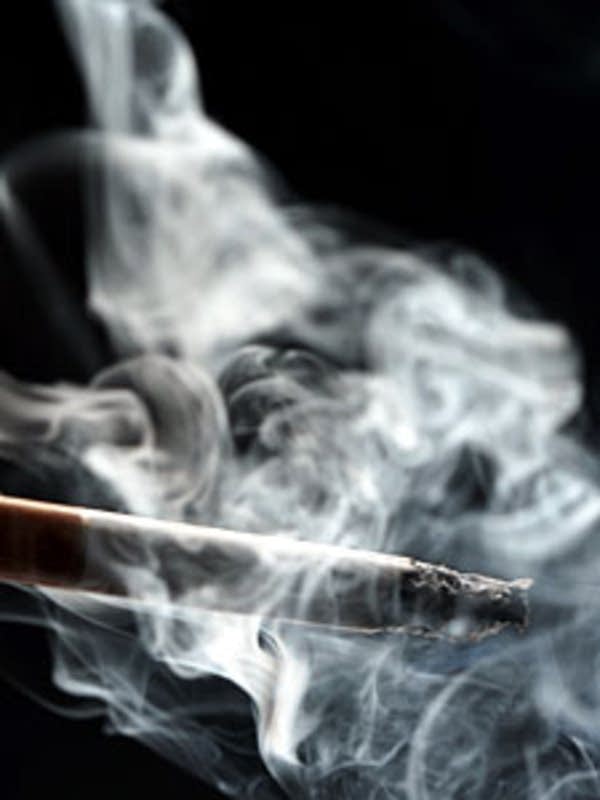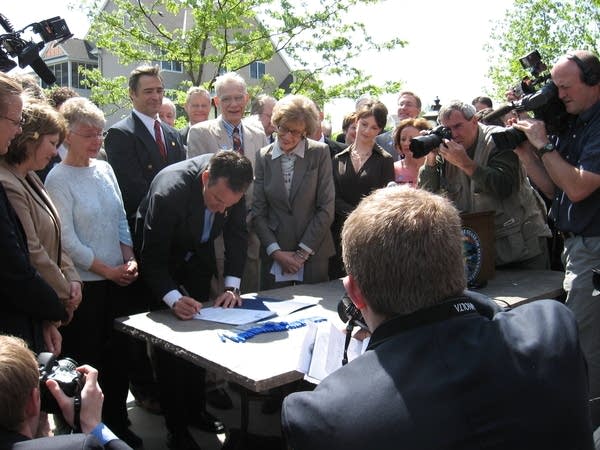After three years, smoking ban compliance better than expected
Go Deeper.
Create an account or log in to save stories.
Like this?
Thanks for liking this story! We have added it to a list of your favorite stories.

Minnesota Health Department officials say compliance with the state's nearly three-year-old indoor smoking ban has been better than expected.
Since the smoking ban took effect on October 1, 2007, 326 people have reported smoking violations to the state. That's less than what department officials anticipated, said John Olson, the department's enforcement coordinator for indoor air.
"It's gone quite well," he said. "We've had fewer complaints than we expected, we've had better compliance."
Olson said state health officials got an indication early on that most people would obey the smoking ban when there were fewer than expected complaints during the first nine months the ban was in effect.
Turn Up Your Support
MPR News helps you turn down the noise and build shared understanding. Turn up your support for this public resource and keep trusted journalism accessible to all.
"If you would have told me that we'd only have 168 complaints, I would have been pleasantly surprised," Olson said.
Since then, violations have fallen steadily. They dropped to 65 in the year ending last month. Olson said one reason for the wide-ranging compliance is that the state's active pursuit of illegal indoor smoking sent a message.
"We demonstrated pretty early that we were going to enforce the law," Olson said.
The enforcement included a wide range of entities open to the public: bars and restaurants, but also Main Street businesses like real estate offices. There were even some local government offices busted.

The state received complaints of smoking at three municipal liquor stores in the towns of Nevis, Callaway and Mahnomen; at fire halls in Morgan and Bigfork; and in the office of the top law enforcement officers in the town of Sebeka. Investigators found an ash tray and a cigarette butt in the police chief's office.
The city of Sebeka was the only government fined. State health officials eventually forgave the $1,400 penalty after city officials posted signs and made sure all indoor smoking was eliminated.
The state's tough stance led most establishments to quickly accept the ban. That even included some companies investigated for violating the smoking law.
"When I got that letter from the state of Minnesota I went 'oh gosh,'" said Rich Olsen, who owns Olsen Diesel in St. James in southern Minnesota. "Now what am I going to do?"
Olsen said that after that initial surprise, his thoughts quickly turned to the informant. "Who was the dirty, rotten little bugger that turned me in?"
Although Olsen never received an answer to that question, he said he now believes it was a good thing the informant turned him in. Officials fined his business $1,100 but later forgave the penalty after Olsen cracked down on indoor smoking.
He said the state action helped some of his employees cut back on smoking, and may even have encouraged a couple of people to quit smoking altogether.
But not all business owners reacted like Olsen. Some bar owners mounted a brief rebellion against the law. Claiming the law exempted theatrical performances, they staged "theater nights" where customers smoked as part of the evening's performance. The courts eventually rejected the gambit.
Attorney Mark Benjamin, who led the theater night effort, said the move was in part an effort to save jobs. He said the smoking ban has eliminated jobs in the bar and restaurant industry, and affected more than just those who wait on customers.
"Distributors of beer and alcohol, the DJs who would provide the music for dancing, the bands -- the ripple affect has been huge and it has been in our opinion a net negative," Benjamin said.
State officials have a different take. Minnesota Department of Employment and Economic Development research director Steve Hine said it's true there was a significant employment drop for the entertainment business after the smoking ban took effect in late 2007. But he said that was also when the Great Recession started.
"I would really have to attribute the vast majority, if not all of the employment change to economic conditions," Hine said.
He said the June jobs numbers support that conclusion. They show eating and drinking business employment has recovered and is now slightly above pre-recession levels.
Hine said that sort of recovery would be unlikely if the smoking ban had caused permanent job losses.
Dear reader,
Your voice matters. And we want to hear it.
Will you help shape the future of Minnesota Public Radio by taking our short Listener Survey?
It only takes a few minutes, and your input helps us serve you better—whether it’s news, culture, or the conversations that matter most to Minnesotans.




